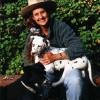In honor of this here release, we've whipped up a very special listening party featuring track-by-track commentary from our 30 TRIPS DEFINITIVE LIVE STORY liner note scribe Jesse Jarnow.
Viola Lee Blues (Noah Lewis)
November 10, 1967, Shrine Auditorium, Los Angeles, CA
Just over a month after taking on Mickey Hart as a second drummer, the Grateful Dead materialized in Los Angeles for their first stand in the city since a two-month residency the previous spring. Their arrangement of “Viola Lee Blues,” a favored improv vehicle since its 1966 introduction, is a window into what the sparkling new model six-man Grateful Dead sounded like with all pistons firing. The last of the song’s jams roars into the white void powered by volcanic double-drumming, while Garcia, Lesh, and Weir’s high-speed chatter blurs into drone and light and cloud. “The Electric Wonders,” advertised the not-inaccurate poster for the two-night appearance at the Shrine Auditorium, where the Dead played alongside the Buffalo Springfield and Blue Cheer. Like the Dead, the latter group also sometimes received funding from acid chemist/patron Owsley Stanley, though unlike the Dead, were cross-branded with a specific line of Stanley’s product. Achieving liftoff on this “Viola Lee Blues,” the Dead miraculously shoot back into the top, a better advertisement than even the world’s most celebrated acid chemist could provide.
Uncle John’s Band (Garcia/Hunter)
September 18, 1974, Palais des Expositions, Dijon, France
An instant Deadhead favorite and long-term FM radio staple, the band reserved “Uncle John’s Band” for big late-show moments beginning soon after its late 1969 debut. Trekking through Europe with the enormous Wall of Sound speaker array — sent over by ship with a large stash of the band’s pot supplies — the Dead themselves were on the verge of retiring from the road indefinitely (or so they thought). But playing to a few hundred people in the French countryside seemed to give energy to the road-weary ensemble, and, in Dijon, “Uncle John’s Band” made a rare show-opening appearance in front of the tiniest Dead audience in years. The band shifts effortlessly into the jam and the music stretches casually, suggesting a number of spaces and possibilities, as if bookmarking them for the mammoth second set to come, from Garcia’s pointing solos to the coolly locked-in spaciousness discovered by Messrs. Weir, Lesh, Godchaux, and Kreutzmann just before the vocal coda.
Estimated Prophet (Weir/Barlow)
April 25, 1977, Capitol Theater, Passaic, NJ
After recording Terrapin Station with producer Keith Olsen in Los Angeles in the early winter of 1977, the Grateful Dead hit the east coast in the spring bearing their now-annual bushel of new material. By May, Bob Weir’s “Estimated Prophet” would migrate to the second set and become one of the band’s go-to improv vehicles all the way through 1995. But at the tour’s start, Weir and lyricist John Perry Barlow’s sly 7/8 reggae take on one-toke-over-the-line California-style street messiahs, seen lurking around backstage doors, stood by itself. Still more of a solo than a jam during the first Passaic ’77 take, the band drops into a space shaped by Garcia’s recently acquired MU-TRON III guitar pedal and Keith Godchaux’s Polymoog synthesizer, giving this and all of the revered tour’s renditions their distinct late-’70s sheen. Playing the song all three nights in Passaic (followed by all five nights in New York), “Estimated Prophet” was the newest of the new, ready to shine.
Lost Sailor/Saint Of Circumstance (Weir/Barlow)
October 27, 1979, Cape Cod Coliseum, Cape Cod, MA
Debuted in 1979 — the same year as the Dead’s new keyboardist, Brent Mydland — “Lost Sailor/Saint Of Circumstance” was the last in a series of the mini-suites the band had built since 1967. Released on 1980’s Go To Heaven, the pairing would stay in the band’s repertoire for over a half-decade, a dynamic set-piece building from a soft strum through a frantic jam to a gospel-tinged finale that showcased the band’s new three-man vocal blend of Garcia, Weir, and Mydland. Featuring a few early draft lyrics and long stretches of quiet drums, or even only light cymbals, the seaside “Lost Sailor” from Cape Cod is a quiet breath setting up the swirling Garcia-ready tempest of “Saint Of Circumstance.” Like other early versions, this Cape Cod ’79 take highlights the bright bell-like tones Mydland coaxed from his Fender Rhodes, a new color for the band’s tone palette and a ringing contrast to his predecessor Keith Godchaux’s more atmospheric approach to the same keyboard.
Blow Away (Mydland/Barlow)
October 26, 1989, Miami Arena, Miami, FL
Debuted in the early summer of 1988, “Blow Away” was one of four songs co-penned by Brent Mydland, the most-represented of any of the band’s songwriters on Built To Last — the final Grateful Dead studio album, released less than a week after this Miami performance. One of eleven Mydland originals introduced into the band’s set lists during his dozen years in the keyboard chair, “Blow Away” is a typical Mydland composition, far from the experimental psychedelia, dense jazz-rock, and Americana of the Dead’s earlier periods, instead building from standard blues-rock forms with a pay-off at Mydland’s growled vocal ad-lib coda. Also heard on this take is some of the band’s earliest song-based use of MIDI, the new synthesizer gear attached to all six of the musicians’ instruments. Initially most often used during “space” segments, here, a digital trumpet section blows from Mydland’s synth set-up during a brief solo at the song’s mid-point.



